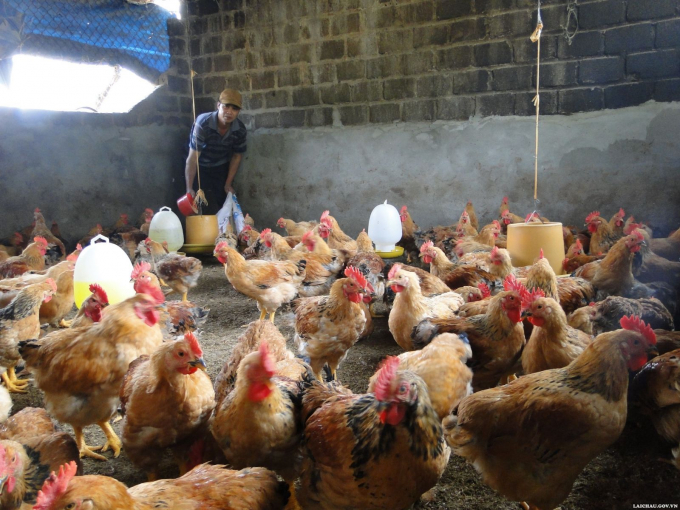May 24, 2025 | 16:28 GMT +7
May 24, 2025 | 16:28 GMT +7
Hotline: 0913.378.918
May 24, 2025 | 16:28 GMT +7
Hotline: 0913.378.918

Poultry disease in Lai Chau Province has basically been controlled. Photo: T.L.
Specifically, the Provincial People's Committee has issued Directive No. 16/CT-UBND on drastically and synchronously implementing measures to prevent and control livestock and poultry diseases in the winter-spring crop 2021-2022.
Since the beginning of this year, epidemics in livestock herds have infected thousands of cattle in the province, for example, Foot-and-mouth disease has occurred sporadically on cattle; the lump skin disease has appeared since the end of April and African swine fever has recurred since early May.
It is estimated that 1,116 cattle have been infected (149 animals have been cured, 967 have died and been destroyed) by now.
In particular, one person in Muong Te District has died from rabies and over 500 others in the province have had to be vaccinated against rabies.
Currently, the epidemics have been basically under control and 16 of 26 communes have announced the end of the epidemics.
However, there is still a high risk of dangerous diseases in livestock herds that will recur and spread in the winter-spring crop of 2021 – 2022.
Therefore, the Chairman of Lai Chau Provincial People's Committee has asked districts and cities to guide farmers to increase the application of biosecurity measures.
"Environmental Sanitation and Disinfection Month" campaign will be launched to destroy pathogens existing in the areas of breeding, gathering, trading and slaughtering cattle.
Meanwhile, the local authorities have also demanded active monitoring of livestock and poultry diseases, especially in the epidemic hot spots, areas where disease outbreaks have appeared and those with high risk for early detection, warning and thorough treatment when the epidemic is still within a narrow scale.
In particular, the Chairman of this Provincial People's Committee has requested to strengthen the management of quarantine and control of the transport of animal and animal products; organize to prevent and strictly handle cases of transporting animals and animal products that have not been quarantined, especially illegally imported ones.
Other measures include inspecting to timely detect and strictly handle cases of supply and trading of animal feeds, veterinary drugs, aquatic products, and vaccines that fail to ensure quality in accordance with current law.
Translated by Luo

(VAN) In the tranquil wetlands of Van Long, there are quiet souls who guard the forests, nurture the waters, and oversee every bird and troop of langurs as protecting the essence of a living heritage.

(VAN) WWF, GIZ, IUCN, UNDP call for biodiversity conservation and sustainable development must be regarded as a unity in strategies for a green future.

(VAN) On celebration of International Day for Biological Diversity, Deputy Minister Nguyen Quoc Tri called for practical actions to address nature and biodiversity conservation.

(VAN) Dr. Hoang Thi Thanh Nhan – Deputy Director of the Nature and Biodiversity Conservation Agency – highlighted this on the International Day for Biological Diversity, May 22, 2025.
![Ho Chi Minh city adapts to climate change: [2] Accelerating action](https://t.ex-cdn.com/nongnghiepmoitruong.vn/608w/files/chiqk/2025/05/22/4024-4220-bien-doi-khi-hau-1-100626_766.jpg)
(VAN) Clearly recognizing the challenges posed by climate change, Ho Chi Minh city has swiftly shaped its policies and implemented practical solutions to adapt.

(VAN) Rice straw is no longer just a discarded byproduct, but it is becoming a green resource that helps farmers in the Mekong Delta reduce emissions and promote circular, sustainable agriculture.

(VAN) Other Effective Area-based Conservation Measures (OECMs) are solutions that contribute effectively to achieving the goals of the Kunming–Montreal Global Biodiversity Framework.